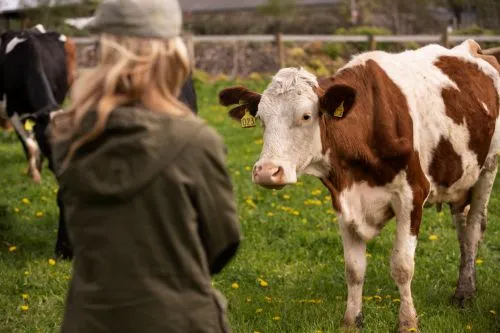1515

According to DairyGlobal, it has been demonstrated that cows fed with botanical extract of capsicum oleoresin, derived from hot peppers and/or clove oil, help dairy cows utilize food energy more efficiently and emit less methane from their largest stomach.
Improved efficiency
Adding essential oils to cattle rations has led to improved energy utilization efficiency in peak lactating dairy cows, according to a study conducted by Penn State researchers in the United States.
The findings suggest that cows would use available energy for body weight gain rather than milk production or milk components. They suggest a potential positive physiological and environmental effect of supplementation due to the combination of botanical substances.
From previous studies, researchers knew that botanical substances have the potential to modify fermentation in the cow's rumen, but lead author Professor Alex Hristov said he was particularly interested in the post-ruminal physiological effects of botanicals.
His research group at the College of Agricultural Sciences experimented with supplementing feed for high-performing dairy cows with a range of additives, including seaweed oils, garlic, and oregano, to synthetic additives, in an attempt to reduce dairy product emissions from dairy farm environments.
Reducing methane emissions
Although methane mitigation was not a project goal, researchers found that methane yield and intensity from the study cows decreased by 11% through the combination of capsicum oleoresin and clove oil, with the effect being particularly pronounced in first-lactation cows.
"We concluded that capsicum oleoresin may affect the energy and nitrogen utilization by cows, while ruminal fermentation and methane mitigation effects were likely triggered only by an associative effect of capsicum oleoresin and clove oil or clove oil alone," said Hristov.
Botanical products have demonstrated a wide range of antimicrobial properties against bacteria, protozoa, and fungi and have been investigated as potential rumen modifiers in ruminants.
Studies with non-ruminant species have shown that phytonutrients can trigger, at low doses, specific health-related responses in gastrointestinal health and immunity in animals. Various botanical substances, with active ingredients such as eugenol, cinnamaldehyde, allicin, and capsaicin, can trigger immune responses, reduce oxidative stress, and influence insulin secretion and activity, said Hristov.
Other studies have shown that botanical substances can regulate pro or anti-inflammatory responses by increasing or decreasing inflammatory proteins involved in the immune system, white blood cells, and oxidative stress in non-ruminants and potentially in ruminants.
The study
The 10-week experiment conducted at the Penn State Dairy Barns, led by Leoni Martins, a doctoral student in animal science, saw 48 Holstein cows randomly allocated to 3 dietary treatments:
16 received rations supplemented with 300 mg of capsicum oleoresin per cow per day.
16 received rations supplemented with 300 mg of capsicum oleoresin and clove oil per cow per day.
16 did not receive supplements in their diet (control group).
Throughout the experiment, body weight increased in cows supplemented with capsicum oleoresin and a combination of capsicum oleoresin and clove oil, by 850 and 660 ng per day, compared to a negligible amount of 10 g per day for the unsupplemented control group.
Cows fed diets supplemented with botanical substances also showed higher energy utilization efficiency, as revealed by several metabolic measurements.
"Using rumen-protected capsicum – which partially passes through the rumen without affecting fermentation but can still be digested in the cow's intestines – represents an interesting approach to improving the metabolic status of dairy cows during the 3-week transition period before and 3 weeks after calving and early lactation, but the mechanism underlying the response remains unclear," added Hristov. (Photo: Freepik)
(The research was published in the Journal of Dairy Science cf: Lactational performance, enteric methane emission, and nutrient utilization of dairy cows supplemented with botanicals. ScienceDirect received support from the US Department of Agriculture, National Institute of Food and Agriculture and AVT Natural Products.)





